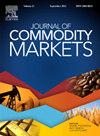How financial markets respond to climate policy uncertainty: A dynamic resilience analysis
IF 4.5
4区 经济学
Q1 BUSINESS, FINANCE
引用次数: 0
Abstract
In the context of the global transition to a sustainable development, focusing on the impact of climate policy uncertainty (CPU) on financial markets is important to prevent green swan events. This paper analyzes the resilience of major stock and commodities markets to CPU shocks from the perspectives of absorption intensity and duration, which imply the ability to withdraw the shocks and recover from them, respectively. Based on these two aspects, we construct a resilience index and explore the impacts of macroeconomic conditions on resilience. We find that most markets exhibit negative responses to CPU shocks, except for natural gas and precious metals. Most markets’ resilience to CPU has intensified, whereas, traditional energy sectors and the agricultural commodities market still shown the most vulnerability to CPU shocks. Compared to negative causality, the macro-economic conditions show higher level of positive causality to resilience. An increase in macro-economic uncertainty can exacerbate the deterioration of market resilience.
金融市场如何应对气候政策的不确定性:动态弹性分析
在全球向可持续发展转型的背景下,关注气候政策不确定性(CPU)对金融市场的影响对于防止绿天鹅事件至关重要。本文从吸收强度和持续时间的角度分析了主要股票和商品市场对CPU冲击的弹性,这两个角度分别意味着从冲击中撤出和恢复的能力。基于这两个方面,我们构建了弹性指数,并探讨了宏观经济条件对弹性的影响。我们发现,除了天然气和贵金属之外,大多数市场对CPU冲击表现出负面反应。大多数市场对CPU的抵御能力已经增强,而传统能源部门和农产品市场仍然最容易受到CPU冲击。宏观经济条件对弹性的正向因果关系高于负向因果关系。宏观经济不确定性的增加会加剧市场弹性的恶化。
本文章由计算机程序翻译,如有差异,请以英文原文为准。
求助全文
约1分钟内获得全文
求助全文
来源期刊

Journal of Commodity Markets
Multiple-
CiteScore
5.70
自引率
2.40%
发文量
53
期刊介绍:
The purpose of the journal is also to stimulate international dialog among academics, industry participants, traders, investors, and policymakers with mutual interests in commodity markets. The mandate for the journal is to present ongoing work within commodity economics and finance. Topics can be related to financialization of commodity markets; pricing, hedging, and risk analysis of commodity derivatives; risk premia in commodity markets; real option analysis for commodity project investment and production; portfolio allocation including commodities; forecasting in commodity markets; corporate finance for commodity-exposed corporations; econometric/statistical analysis of commodity markets; organization of commodity markets; regulation of commodity markets; local and global commodity trading; and commodity supply chains. Commodity markets in this context are energy markets (including renewables), metal markets, mineral markets, agricultural markets, livestock and fish markets, markets for weather derivatives, emission markets, shipping markets, water, and related markets. This interdisciplinary and trans-disciplinary journal will cover all commodity markets and is thus relevant for a broad audience. Commodity markets are not only of academic interest but also highly relevant for many practitioners, including asset managers, industrial managers, investment bankers, risk managers, and also policymakers in governments, central banks, and supranational institutions.
 求助内容:
求助内容: 应助结果提醒方式:
应助结果提醒方式:


